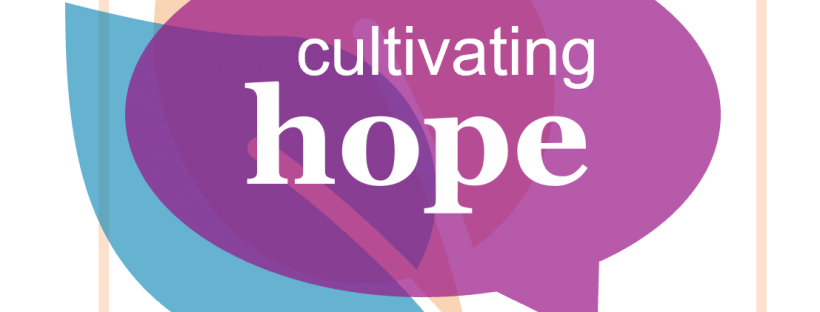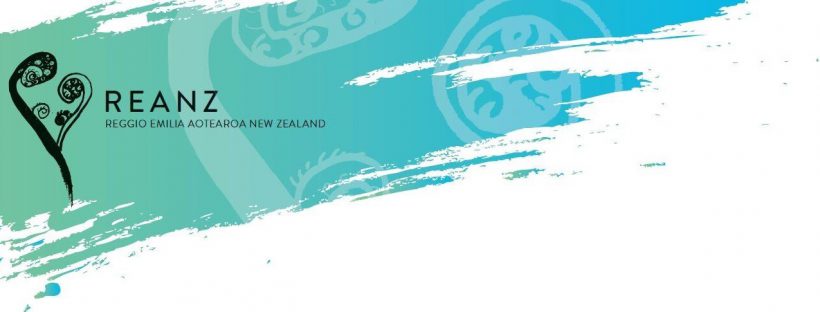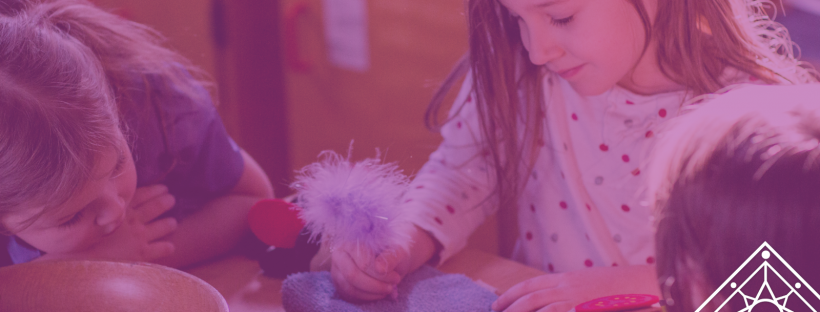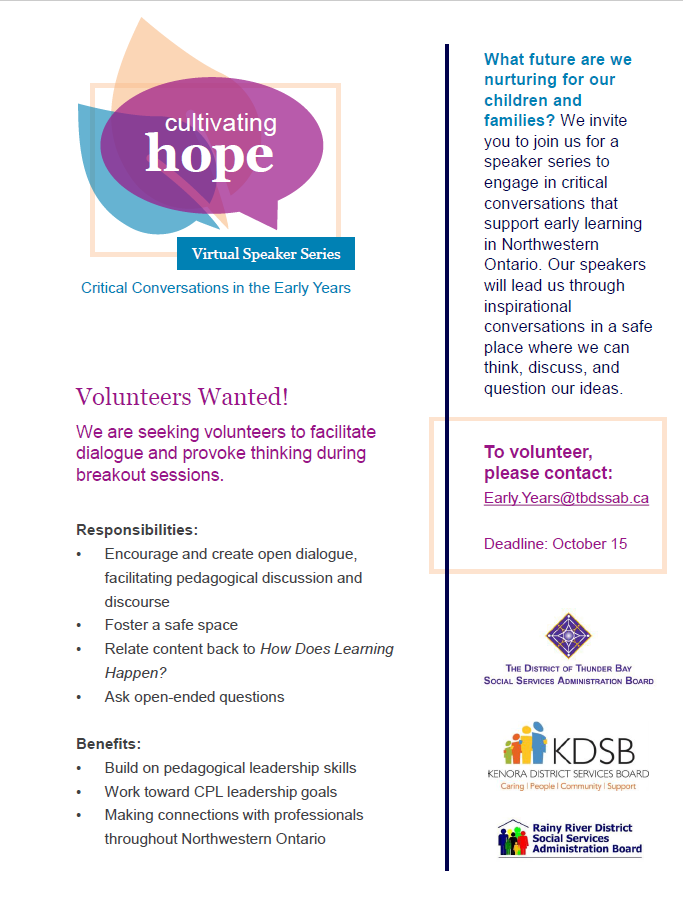
Category: Relationships
Save the Date!
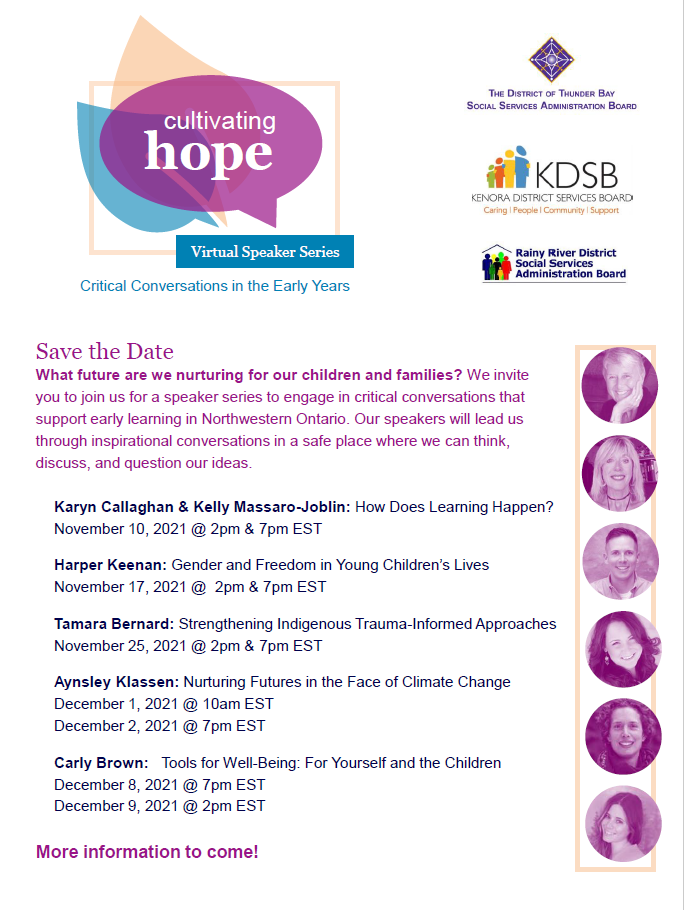
Save the Date: Cultivating Hope Virtual Speaker Series
What future are we nurturing for our children and families? We invite you to join us for a speaker series to engage in critical conversations that support early learning in Northwestern Ontario. Our speakers will lead us through inspirational conversations in a safe place where we can think, discuss, and question our ideas.
Karyn Callaghan & Kelly Massaro-Joblin: How Does Learning Happen?
November 10, 2021 @ 2pm & 7pm EST
Harper Keenan: Gender and Freedom in Young Children’s Lives
November 17, 2021 @ 2pm & 7pm EST
Tamara Bernard: Strengthening Indigenous Trauma-Informed Approaches
November 25, 2021 @ 2pm & 7pm EST
Aynsley Klassen: Nurturing Futures in the Face of Climate Change
December 1, 2021 @ 10am EST
December 2, 2021 @ 7pm EST
Carly Brown: Tools for Well-Being: For Yourself and the Children
December 8, 2021 @ 7pm EST
December 9, 2021 @ 2pm EST
More information to come!
The Courage to Listen Differently
“Listening is a complex state. It involves the abandoning of oneself as we come to know that we are only one being within this vast universe.”(CARLINA RINALDI, 2001)
The Reggio Emilia Aotearoa New Zealand (REANZ) has extended access to their free webinar about listening differently. This is part of a two-part series with the first webinar being available for three more months and the second webinar becoming available on August 30th.
These webinars are “an opportunity for educators to reflect on the critical role of listening and how this permeates the everyday choices we make when we work with children. Kirsty Liljegren and Fiona Zinn will draw on the thinking of the Reggio Emilia Approach alongside their personal perspectives which hold listening at the heart of practice” (REANZ, 2021).
You can access the first webinar here: https://www.reanz.org/events
Quote: Listening
“Listening is a complex state. It involves the abandoning of oneself as we come to know that we are only one being within this vast universe”
CARLINA RINALDI, 2001
View our Calendar for upcoming events!
Pedagogical Documentation
We had a wonderful conversation last week about pedagogical documentation. Three educators joined us who each play a different role in our community – one educator in child care, one supervisor of a before and after school program, and one EarlyON coordinator. This diversity of experience made for a unique dialogue and the opportunity to share different perspectives. We all read the article, Curiosity, Curriculum, and Collaboration Entwined: Reflections on Pedagogical Documentationby Pat Tarr.
As we discussed the article, an interesting dialogue came up around interrupting children’s play. Traditionally, we have been taught to ask children open-ended questions – “what are you building?” “what do you think will happen when you stack another block on top?” We felt that this can sometimes interrupt and change the direction of children’s play, and we agreed that we should be thoughtful in deciding when is a good time to enter children’s play and ask questions. It was said that we need to give ourselves permission to take a step back and observe more.
As the conversation continued, we began thinking about how educators pick and choose what they feel is worth documenting. Tarr (2010) states in the article that “what we choose to document reveals and reflects back to us what we consider important, as well as help us to see ourselves as educators within the educational relationship” (p. 12). This conversation reminded some of us about another article by Pat Tarr that talked about ethics and biases in pedagogical documentation. We shared mixed feelings about this article, and some of us plan to dig a little deeper to decide if or how the information fits with our practice. You can access the article here: Reflections and Shadows: Ethical Issues in Pedagogical Documentation,.
Finally, one of the educators bravely shared her documentation with us. She wondered, “is this documentation?” There isn’t one right way to document children’s learning; taking time to practice documenting and experimenting with different techniques can help educators to feel more confident. We discussed our questions and curiosities about this documentation, and a new idea was shared about “stories from home” (Hedges, 2010). Essentially, “stories from home” is a form that goes home for families to fill out and share a story that took place with their child outside of the early learning setting – it’s getting the families to document!! We discussed that this would be a great way of getting to know children and families better, and building stronger connections between, for example, child care and home.
Let us know what you think about these ideas or about the articles provided in the chat below.
References
Hedges, H. (2010). Blurring the boundaries: Connecting research, practice and professional learning. Cambridge Journal of Education, 40(3), 299-314. http://dx.doi.org/10.1080/0305764X.2010.502884
Tarr, P. (2010). Curiosity, curriculum, and collaboration entwined: Reflections on pedagogical documentation. Canadian Children, 35(2), 10-14.
Tarr, P. (2011). Reflections and shadows: Ethical issues in pedagogical documentation. Canadian Children, 36(2), 11-16.
Communicating with Parents During the Pandemic
We wanted to say a special thank you to Ari Vainio and Jaymie Rusnak for hosting a conversation on communicating with parents during COVID-19. Ari and Jaymie had many clever ideas to support communication with families during these trying times. One unique example is their “virtual playdates”. Ari and Jaymie have scheduled times where families can pop in on Zoom and have a virtual visit in the program. This allows parents to get acquainted with the environment where their child spends so much of their day, and to meet some of the other children that their child plays with. Another creative idea that they shared was offering parents the option of going for a social-distanced walk (when the public health direction allows). Ari and Jaymie shared that they would go for social-distanced walks throughout the Lakehead University campus with families as a way of getting to know each other better. This provided families with a sense of comfort and trust in knowing who they are leaving their child with each day.
While there were many great ideas shared throughout the conversation, we were still left feeling like it wasn’t enough, and that we wish we could have a closer relationship with families right now. This presented as a good reminder for all of us that we are doing the best we can in the circumstances that we are dealt with currently.
Let us know how you’ve been connecting with families in the comments below.
International Women’s Day

Did you know that 97% of Canada’s early learning and child care workforce are women? We wanted to take the time today to say how grateful we are to work alongside so many amazing women who are supporting children and families in our community!
The Gift of Togetherness
The staff at Kanata Research Park Family Centre have put together an exhibit to “[celebrate] the sounds of children, of families, of nature and living things, of imagination, of democracy, of community, of tension, of reunion, and of connection” (para. 2). They reflected on the eerie sound of quiet within the child care centre when the COVID-19 pandemic shut down their programs, and the beautiful sounds when the children returned.
You can find a link to the virtual exhibit in the COVID-19 section of our Portal.
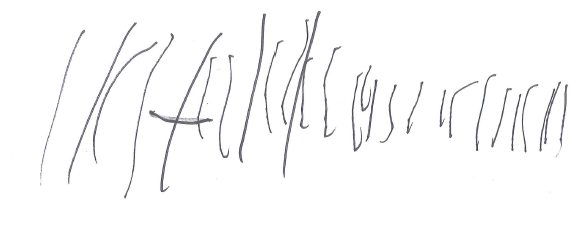
Sound Waves, Gia age 5
What story could you tell?
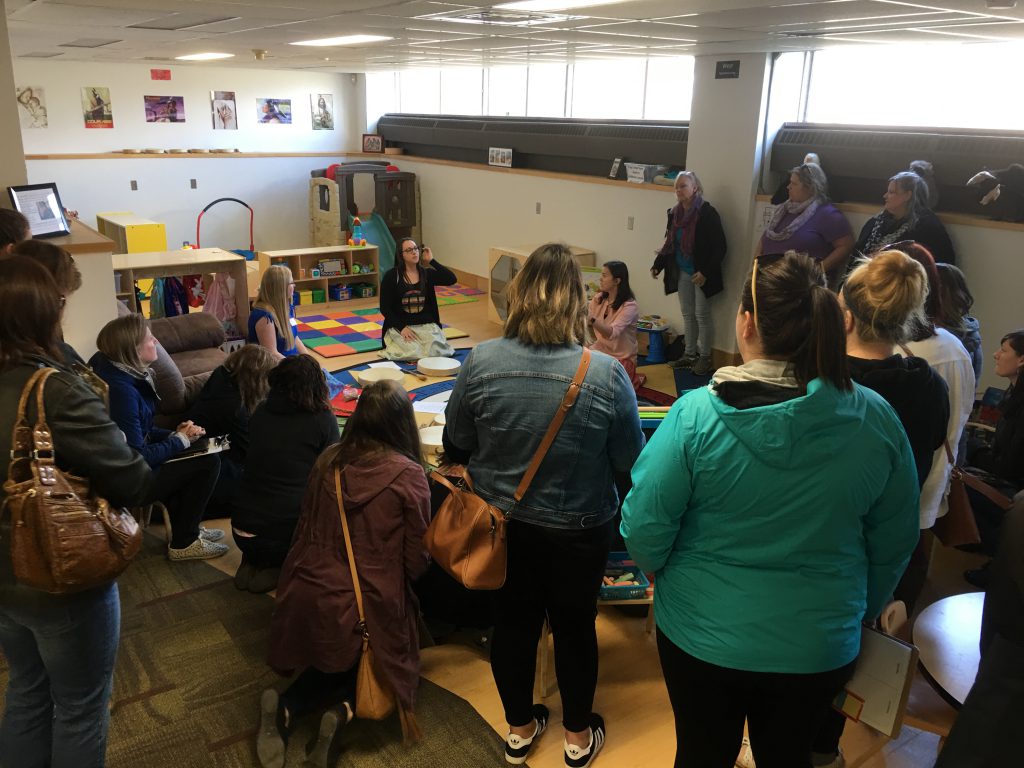
The District of Thunder Bay Social Services Administration Board recently offered a survey regarding staff well-being. Some of the feedback from this survey was to support staff through re-connecting and opportunities to support mental health.
We know that many of the staff working in child care and EarlyON programs in our communities have strengths and talents to inspire, showcase, and bring comfort to others. Do you or does your centre have a skill to share? A story to tell? Perhaps you have a colleague that has a gift that you recognize others should see. Whether it’s documentation, cooking, crafting, or storytelling, we would like to hear what you could share virtually among our community!
Submit your idea to us at early.years@tbdssab.ca
Piazza ORA
The TBDSSAB pedagogical team will be participating in this year’s Piazza ORA (see information below). We encourage you to reach out to us if you are interested in this opportunity; a group of 6 or more from our community will allow everyone to receive a discounted rate. Please contact us by Friday, February 5th to express your interest in joining us for the group rate, early.years@tbdssab.ca.
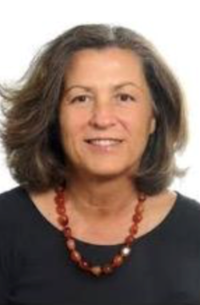
The Ontario Reggio Association is providing an extraordinary opportunity to engage with Tiziana Filippini, pedagogista from Reggio Emilia, over the course of four encounters. This also includes four interim gatherings (a total of eight gatherings altogether).
Piazza ORA 2021 Dates
February 16 6:30-7:30 pm (introduction with participants only)
February 23 12:30-2:30 pm
March 9 6:30-8:00 (interim session with participants only)
March 30 12:30-2:30 pm
April 13 6:30-8:00 (interim session with participants only)
April 27 12:30-2:30 pm
May 11 6:30-8:00 (interim session with participants only)
May 25 12:30-2:30 pm
The focus this year will be on intentionality in the teacher’s role as co-protagonist of learning. Intentionality is key in shaping activities, knowing what to document and when and how to respond while allowing children to learn together in relationship. Understanding better the role of the adult in children’s learning can be the thread that is woven through our “across the province” action research projects.
Please clickHEREfor more information.

